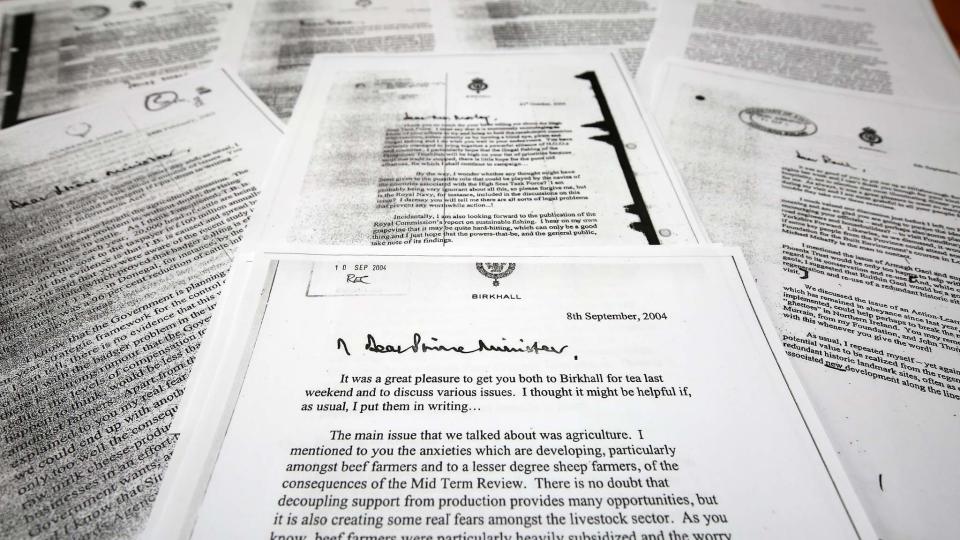Charles' Secret 'Black Spider' Letters Released
Secret letters sent by Prince Charles to government ministers have finally been made public after a 10-year court battle, estimated to have cost the taxpayer £400,000 in legal fees.
The correspondence - known as the "black spider" memos because of the heir to the throne's unusual handwriting style - was sent between September 2004 and March 2005, when Tony Blair was prime minister.
The 27 letters were published by the Guardian, the Information Commissioner and the Cabinet Office on Wednesday afternoon.
They reveal a keen working relationship between the Prince of Wales and Mr Blair.
:: Highlights Of Charles' Memos To Ministers
In one memo, Charles lobbied Mr Blair to replace Lynx military helicopters and said Britain's armed forces were "being asked to do an extremely challenging job (particularly in Iraq) without the necessary resources".
He also warned of Britain's lack of self-sufficiency in producing meat and vegetables, and urged Mr Blair to bring in a badger cull.
In a letter on 8 September 2004, Charles asks the PM to put "pressure" on the Department for Environment, Food and Rural Affairs over the bureaucratic burdens facing farmers.
"Vigilance is essential to help officials resist returning to type!" he warned.
:: Read Prince's Letter To Blair On Defence And Farming
Charles also complained to Mr Blair about the Office of Fair Trading - an independent body responsible for protecting consumer interests in the UK.
"Unfortunately, I am told that the Office of Fair Trading is becoming a serious obstacle to developing dairy co-operatives of the necessary size and influence," he wrote.
"As I understand it, it sees the United Kingdom as ring-fenced with the Channel acting as a barrier to imports, which is, of course, ridiculous."
He added that Mr Blair had said he would look at the matter and "see if there was anything which could be done to help the O.F.T to take a wider view".
Other topics include the regeneration of historic buildings, healthy food, herbal medicine, and acupuncture.
The Prince is understood to be "disappointed" his counsel has been made public.
Earlier, one of his senior aides ripped the cover off a TV journalist's microphone.
Kristina Kyriacou, the Prince's communications secretary, took exception to Channel 4 News' Michael Crick when he asked Charles if he was "worried" about the letters being made public.
Ms Kyriacou, who previously represented Cheryl Cole and Gary Barlow, used her body to block Crick approaching Charles before grabbing his microphone and pulling off its cover.
It took place as Charles arrived at Marks and Spencer's flagship store on London's Oxford Street to highlight a work placement scheme between the retailer and his Prince's Trust.
Charles did not reply to the questions but said "very predictable" as he entered the store.
A Guardian journalist initially attempted to get the letters released under the Freedom of Information Act but was unsuccessful.
After a lengthy appeal process, the UK's highest court, the Supreme Court, finally agreed to quash the ban on their publication last month.
The Government's attempts to block their release has cost the taxpayer more than £400,000 in legal fees, The Guardian reported.
The money was spent by eight government departments as former attorney general Dominic Grieve tried to stop their publication, claiming it would undermine the principle of the heir to the throne being politically neutral.
The newspaper's editor-in-chief Alan Rusbridger said: "We fought this case because we believed - and the most senior judges in the country agreed - that the royal family should operate to the same degrees of transparency as anyone else trying to make their influence felt in public life."
A Clarence House spokesman said the letters show Charles "cares deeply about this country and tries to use his unique position to help others".
He said: "The publication of private letters can only inhibit his ability to express the concerns and suggestions which have been put to him in the course of his travels and meetings."
Sky News' royal commentator Alastair Bruce said: "He is a private citizen like you and me and he is allowed, like you and I, to write to ministers.
"The Prince of Wales gets to visit parts of British life that is incredibly wide. I don't think from what I've heard so far that the Prince of Wales has taken on a political stance here.
"The monarchy is allowed to guide, advise and warn. I think people generally are more cautious about what they write down these days…"
Indeed, in a letter on 24 February 2005, the Prince joked to Mr Blair about the Freedom of Information Act - the very legislation which revealed his lobbying 10 years later.
He wrote: "It was very good to see you again the other day and, as usual, I much enjoyed the opportunity to talk about a number of issues.
"You kindly suggested that it would be helpful if I put them in writing - despite the Freedom of Information Act!"

 Yahoo News
Yahoo News 

